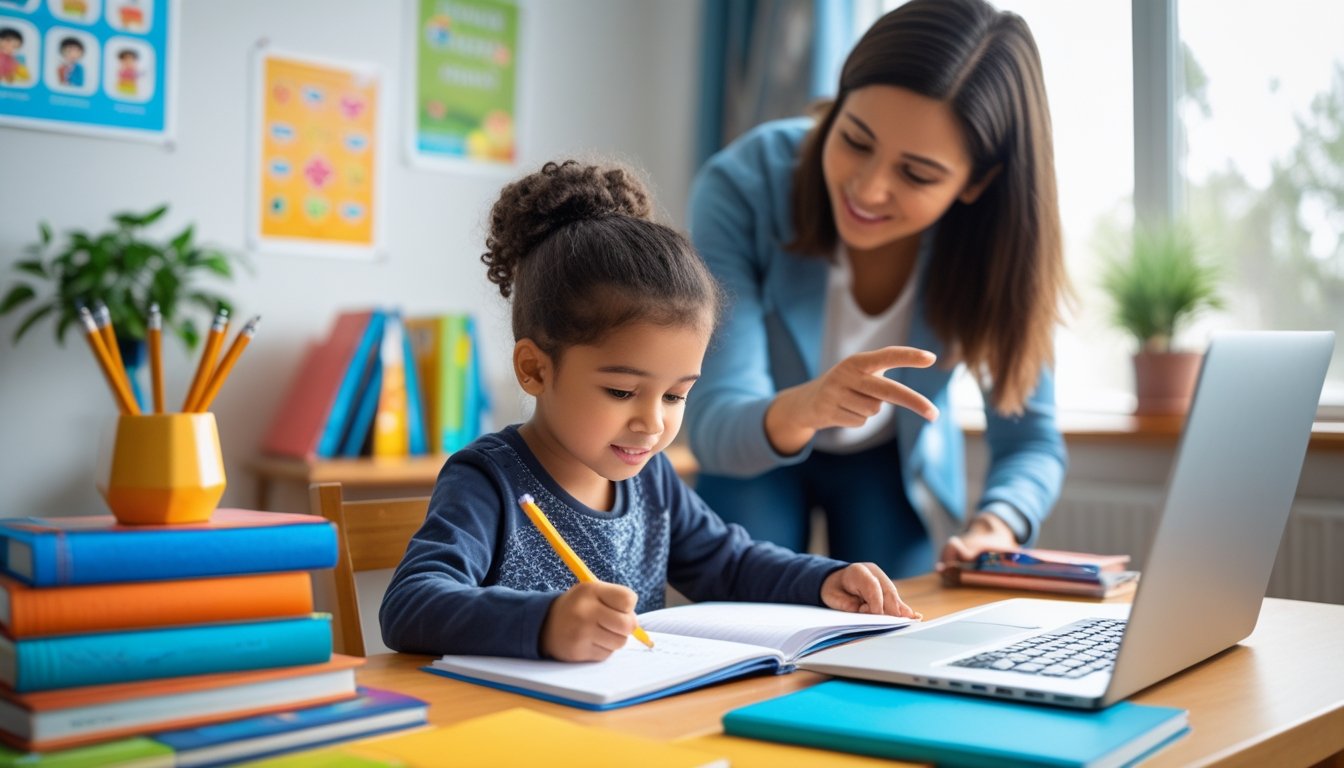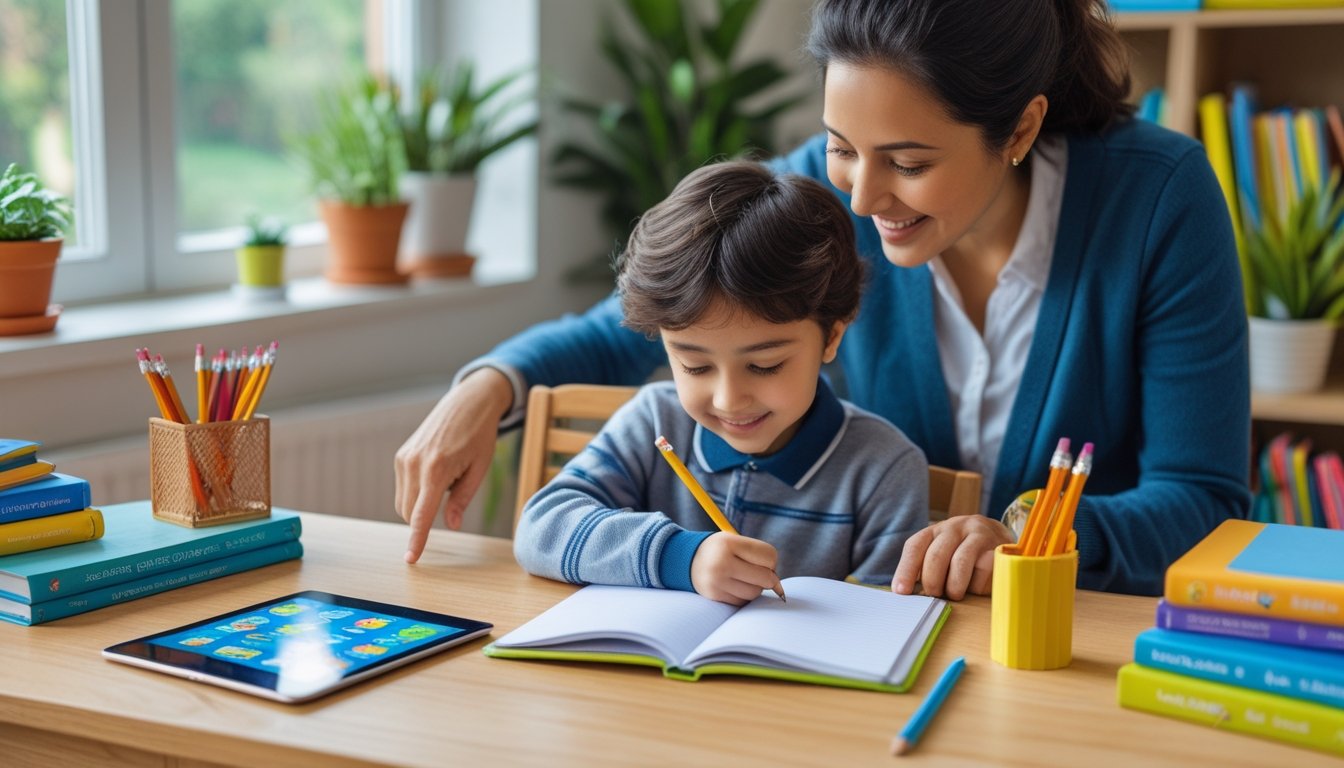Late updated: 10 May 2025 10:05
Written by:
Enhancing Children's Study Skills At Home: Practical Tips for Parents
Enhancing our children's study skills at home can seem like a challenging task, yet it is one of the most rewarding investments we can make in their future. Equipping our children with effective study habits early on not only empowers them academically but also helps build lifelong skills critical for personal growth. Creating an environment that encourages focus and academic curiosity is essential for unlocking their full potential.

Practical strategies can make significant differences in a child's learning journey. An organised study routine coupled with a conducive learning space sets the foundation for better concentration and motivation. With a mindful approach, we can guide our children to develop habits that will aid them throughout their education.
Encouraging children to engage with their studies actively can sharpen their comprehension and retention. Techniques like interactive discussions, goal-setting, and active note-taking turn learning into an engaging process. We believe that by implementing these strategies, we can nurture their academic excellence and foster an enduring love for learning.
Key Takeaways
- Direct parental involvement improves study skills at home.
- A structured environment promotes consistent learning habits.
- Active learning strategies enhance understanding and engagement.
Fundamental Strategies to Enhance Children's Study Skills at Home

Home learning offers a unique opportunity to develop children's study skills effectively. By focusing on building effective study habits, establishing a robust organisation and routine, and fostering independent learning, we can significantly contribute to their academic success and growing independence.
Building Effective Study Habits
Creating a conducive learning environment is crucial for cultivating good study habits. Remove distractions to ensure children remain focused on their work. Encouraging short, frequent study sessions can improve concentration and retention. We might consider adopting the Pomodoro Technique, which involves 25-minute focused work sessions followed by short breaks. Additionally, integrating technology responsibly, such as educational apps and tools, enhances engagement and learning outcomes. Consistent reinforcement of these habits helps in gradually building a strong study routine, essential for effective learning.
Organisation and Routine for Home Learning
Organisation plays a vital role in supporting school success. Set a specific study area at home equipped with necessary supplies. This dedicated space helps children separate study time from leisure, reinforcing a disciplined approach. Establish a routine with a set time for homework and study each day. Having a visual schedule can assist children in managing assignments and deadlines. Moreover, utilising checklists boosts accountability and ensures nothing is overlooked. When children are organised, they can focus more efficiently, greatly enhancing their study skills.
Encouraging Independent Learning
Encouraging independence in learning empowers children and boosts literacy. We can promote this by setting specific, achievable goals. Encourage self-assessment by letting them track their own progress. This not only fosters accountability but also builds confidence in their abilities. Providing access to age-appropriate resources, such as books and online tools, complements their learning journey.
Moreover, prompt self-learning by engaging in exercises that allow exploration and creativity. This approach helps build critical thinking and problem-solving skills, essential for lifelong learning. By fostering an environment that values independent study, we prepare our children for the demands of future educational and career landscapes.
Practical Techniques to Strengthen Learning and Comprehension
By focusing on memory retention, practice exercises, and vocabulary enhancement, we can implement effective strategies to support our children's learning in a holistic manner.
Improving Memory and Retention
Enhancing memory and retention helps in solidifying learned concepts. We can use index cards for flashcards, which facilitate active recall by having children repeatedly quiz themselves on different topics. Mnemonics and visual aids also serve as powerful tools, as they make connections between new information and what is already known. Another strategy includes turning lessons into stories. Storytelling helps children better connect with and remember the material. Additionally, encouraging regular breaks optimises the brain's ability to absorb information by preventing cognitive overload.
Using Practice Problems, Workbooks, and Practice Tests
Hands-on practice is crucial in reinforcing learning. Practice problems from workbooks enable children to build confidence and familiarity with academic topics. Utilising practice tests sharpens test-taking skills by simulating exam conditions and timing. These activities pinpoint strengths and reveal areas needing more attention. Working through a variety of problems enhances problem-solving abilities. Our focus should be on consistent practice rather than cramming, fostering long-term understanding. It's beneficial to review mistakes together, exploring correct solutions and discussing alternative approaches. Customised practice sessions can further target specific goals.
Enhancing Vocabulary and Language Skills
A robust vocabulary lays the foundation for reading comprehension and effective communication. Reading diverse materials—fiction, non-fiction, and poetry—increases exposure to new words. Discussing the readings encourages deeper engagement and understanding. To boost language skills, playing word-based games like Scrabble or engaging in activities that focus on phonological awareness can be especially beneficial. Conversations around unfamiliar words and their contexts aid in vocabulary acquisition. Encouraging children to use new vocabulary in everyday speech or writing will strengthen their language skills. This multidimensional approach ensures children become more expressive and articulate in both spoken and written forms.
Frequently Asked Questions

There are many approaches to helping children improve their study skills at home. Parents can use a variety of methods to encourage effective learning, facilitate better homework practices, and prepare children for exams.
What are effective methods to teach self-study to children?
To encourage self-study, it's crucial to establish a consistent routine. Set regular study times and help children create a structured plan. This helps them build discipline and improve time management.
What activities can enhance study skills in children while at home?
Games that involve problem-solving or critical thinking can boost study skills. Encourage activities like puzzles or educational board games. Reading not only improves comprehension but also expands vocabulary, which is beneficial across all subjects.
How can parents support their children in developing efficient study habits?
Parents should create a quiet and comfortable study environment. Involvement is key: review homework assignments together and help prioritise tasks. Encouraging regular breaks can also prevent burnout.
What strategies can help motivate an underachieving child to study?
We can set specific, achievable goals to boost motivation. Positive reinforcement, like praise or a reward system, can help maintain interest. Identifying and addressing learning challenges early on promotes confidence and engagement.
In what ways can study skills be introduced to elementary students?
For younger children, using visual aids and interactive tools makes learning engaging. Teaching them simple note-taking techniques or using story-based methods can help introduce study skills naturally.
How can a child be prepared to excel in examination conditions?
Practice exams under timed conditions can acclimate children to test environments. Teaching relaxation and breathing techniques can reduce test anxiety. Reviewing past papers together helps recognise question patterns and familiarises them with exam formats.
